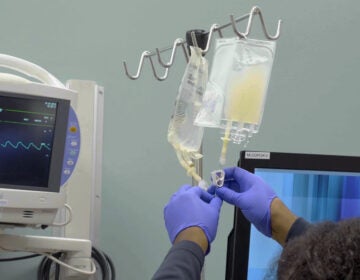Several New Jersey laws will take effect in 2025, including an increase in the minimum wage. Here’s what you need to know
The new laws include an increase to the minimum wage and new data protections for consumers.

The view of the New Jersey Capitol building from Williamson Park in Morrisville, Pa. (Emma Lee/WHYY)
From Philly and the Pa. suburbs to South Jersey and Delaware, what would you like WHYY News to cover? Let us know!
With the advent of the new year, several new laws in New Jersey are kicking in. Here’s what you need to know:
Minimum wage, weekly unemployment insurance increases
On Jan. 1, the minimum wage in the Garden State will increase by $0.36 an hour, to $15.49 per hour total, and the maximum weekly benefit rate for Unemployment Insurance claims will jump $21 to $875 total. The New Jersey Department of Labor and Workforce Development sets the minimum wage based on Consumer Price Index data provided by the U.S. Bureau of Labor Statistics.
Freedom to Read
The Freedom to Read Act is designed to prevent book banning in schools and libraries, and to protect the rights of students, parents and communities to have free access to age-appropriate books and learning materials.. The new law will also provide legal protection for librarians and other staff from civil and criminal lawsuits.
Data protection
Beginning Jan. 15, the New Jersey Data Protection Act will require entities to notify consumers about collection and distribution of personal data. Consumers will also have the right to opt-out of data collection and disclosure if they are concerned about privacy.
Expanding affordable housing
A new law establishes a system for municipalities to meet their Mount Laurel affordable housing obligations, replacing the current process that exists entirely in the courts. This process will replace the role previously played by the Council on Affordable Housing (COAH), which has been defunct for over a decade and will now be formally abolished. The law is designed to streamline compliance and reduce litigation-related delays for the construction of new affordable housing, giving municipalities and developers more certainty and control over where housing should be built.
Rights of sexual assault victims
New Jersey’s “Sexual Assault Victim’s Bill of Rights” will be expanded in 2025, requiring sexual assault victims to be notified if a DNA profile of an assailant is obtained from evidence in a case, or if a DNA profile of an assailant is entered into any data bank for retention or comparison of evidence. A sexual assault victim must also be notified if there is a match between the DNA profile of the assailant in their case to a profile contained in any data bank. The updated law also requires victims to be notified if evidence from their case is submitted to a forensic lab.
Teacher certification
A new law eliminates the requirement that a teacher candidate complete a basic skills test. New Jersey’s Board of Education will be prohibited from requiring certain teachers to complete a commissioner-approved test of basic reading, writing and mathematics skills to become certified. The idea is to increase the teacher pool in N.J.
Postpartum health care planning
In the spring of 2025, it will become mandatory for health care providers to create a postpartum care plan with new mothers and pregnant women. This review must include information about the signs and symptoms of postpartum depression, anxiety, breastfeeding support services, contraception options, upcoming future health care appointments and recommended testing or procedures for any ongoing health issues.
Salary transparency and opportunities
Starting June 1, companies in the Garden State will be required to make reasonable efforts to announce opportunities for promotion that are advertised internally, or externally to all current employees in the affected department prior to making a promotion decision. Salary information must also be disclosed.
Medical Debt Protections
Next summer additional protections that are part of New Jersey’s Medical Debt Relief Act will take effect, offering enhanced safeguards for consumers. Starting July 1, all notices to patients about medical debt and billing must inform them about their rights. Interest on medical debt will be capped at 3% and debt collectors are banned from garnishing wages of lower-income earners.

Get daily updates from WHYY News!
WHYY is your source for fact-based, in-depth journalism and information. As a nonprofit organization, we rely on financial support from readers like you. Please give today.






